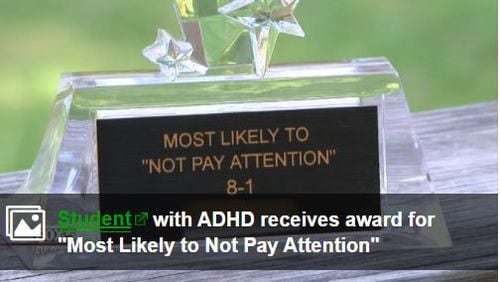I remain dismayed over end-of-the-year student awards that are insulting to the recipients and wish schools would end the practice now.
If students want to informally present each other with mean-spirited or so-called joke awards, they can do so on their own time; it should never be allowed at a school-related event. And certainly teachers should have no hand in awards that mock students in any way.
I know parents still miffed over the “Player most likely to miss practice due to cramps” and “Most likely to throw up on the bus,” both presented at end-of-the-year sports banquets.
Here is a guest column by Julie Rawe, a senior editor at Understood.org, a free online resource and community for parents of kids with learning and attention issues. Rawe spent 13 years at Time as a reporter and senior editor. A mother of two, she lives in Brooklyn, New York.
In this piece, Rawe challenges the local school that gave the "Most likely to not pay attention" award to a girl with attention-deficit/hyperactivity disorder (ADHD).
By Julie Rawe
It wasn’t funny. It was cruel. Last week a middle school in Georgia gave a girl with ADHD an award for “Most Likely to ‘Not Pay Attention.’” The words were engraved on a glass trophy that was presented to her at a school assembly. It was the fanciest form of bullying I’ve ever seen.
Like many parents, I couldn't believe that the school had allowed this to happen. As the story went viral, the school district reacted quickly. It announced that two teachers involved in the awards would not be returning to the school next year.
But something else struck me about this terribly unfunny joke in Georgia. It’s an extreme version of something that’s been happening for years: end-of-the-year awards that tease students rather than celebrate their achievements.
When I was in school, we voted on senior superlatives that were mostly positive. Like “Friendliest” and “Best Smile.” But we had a few that were edgier. The girl who won “Most Likely to Show up at the Wrong School at the 10-Year Reunion” was the class clown. She thought the award was hilarious.
But what about our stressed out classmate who won "Most Stressed"? If winning that award upset her, she didn't show it. Or at least I wasn't aware of it back then.
Which brings me to last week's story in Georgia. According to news reports, the eighth-grader was originally going to be awarded "Most Likely to Ask a Question That Has Already Been Answered."
If the school had stuck with that original wording, or if the child who won the award hadn't been diagnosed with ADHD, most people wouldn't have thought twice about it. They would have just laughed and moved on.
The Georgia story made headlines because of the blatant insensitivity of giving a child with ADHD an award for not paying attention. But there are subtler digs, and we need to put an end to those too.
It’s 2017, and we still have a long way to go in terms of raising awareness and reducing stigma. That’s why this bad joke in Georgia hits so close to home. It’s a reminder that we need to keep pushing for progress.
Neurodiversity is still a new concept to many people. We need to help more students, parents and educators start to understand—and celebrate—kids' differences, not turn them into not a punch line.
About the Author







